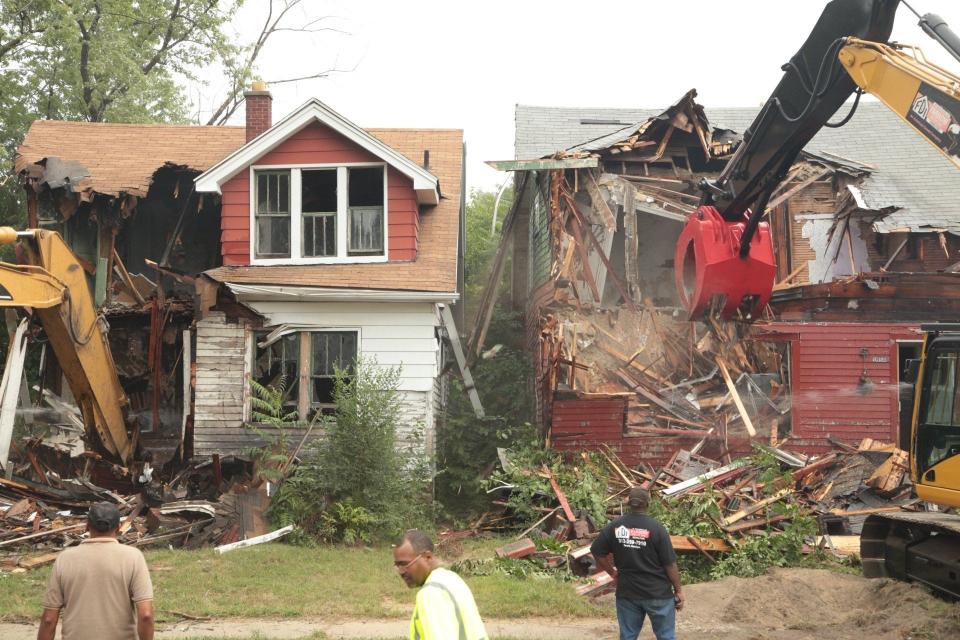Detroit sues Census Bureau, alleging its housing counts underestimate city's population
In a battle to hold the U.S. Census Bureau accountable to accurately count Detroit's population, with the mayor calling the bureau a "clown show," the city is back with another lawsuit against the federal agency.
The city claims the Census Bureau is underestimating Detroit's population, which it says is 625,561, based on demolitions of abandoned structures and ignoring the restoration of vacant homes and construction of new homes, according to a federal lawsuit filed Tuesday.
As a result, the complaint alleges the agency's methodology is "discriminatory" toward cities like Detroit with large Black and Hispanic populations, because the policy "guarantees that poor and minority communities like Detroit will be undercounted" each year.
The mayor's office and U.S. Census Bureau could not be immediately reached for comment.
Battle over how Census Bureau counts demolitions and new housing
Detroit demolished more than 4,000 uninhabitable abandoned homes in 2021 and 2022, which the federal agency calculated as a population loss of 8,000 people. The bureau treats the demolition of vacant and uninhabitable structures, a years-long initiative to eliminate the city's blight, as lost housing units. For each demolished building, the agency subtracts about two residents from its population estimate, according to the lawsuit.

The city attempted to submit increased housing units from construction that was completed without a building permit or other formal city approval, but the Census Bureau rejected it because it counts new housing units through new building permits, dismissing residents who restored old properties without permits.
The lawsuit, again, calls the formula discriminatory because in older cities like Detroit with an abundance of abandoned buildings, new families moving to Detroit are less likely to build a new house from scratch.
"There are thousands of vacant, uninhabitable buildings that can be renovated more cost-effectively — and these renovations are frequently done without a formal permit. Estimating the increase in housing stock based upon new permits alone misses thousands of newly inhabitable houses," according to the complaint.
Post office, DTE and water customer data show Detroit growth
Mayor Mike Duggan has publicly dubbed the Census Bureau a "national clown show" after the agency reported a decrease in Detroit's population, despite efforts proving otherwise. The city sued the Census Bureau in 2022, claiming it missed thousands of residents in its 2021 population estimates.
Detroit protested against the Census Bureau's reported population figures in 2021 and 2022, sending the message that the city's community development and business investment is declining. Federal and state appropriations depend on the accuracy of population estimates, according to the complaint.
As of Feb. 24, the agency responded to Detroit's challenge by increasing its estimate by 2,470 for 2021, to 630,637; and by 5,185 for 2022, from 620,376 to 625,561. As of Thursday, the bureau still listed the 2022 population at 620,376 — just a third of the population in 1950, when Detroit was the nation's fifth-largest city.
The city claims the bureau's figures "woefully" understate the population after submitting evidence from the U.S. Postal Service, DTE residential utility customers and the Detroit Water and Sewerage Department. Those data sources showed annual increases in inhabited and inhabitable housing units, according to the lawsuit.
Detroit "will be short-changed hundreds of millions of federal and state dollars, while the false story that Detroit is losing population threatens to slow the momentum of the city’s growth," according to the complaint.
Furthermore, Detroit is fighting the "county cap" rule, which determines city population estimates based on population estimates of all towns and cities within the county. It "cannot exceed the county’s population estimate" even when "verifiable evidence" Detroit's population is increasing.
"The County Cap punishes the City of Detroit by reducing the city’s population estimate, not because of an actual decrease in Detroit’s population, but because of population lost in other Wayne County cities or because of the Census Bureau’s failure to properly estimate Wayne County’s population," according to the complaint.
The county cap rule reduced Detroit’s population estimate by 7,192 people for 2021 and by 13,407 for 2022, according to the lawsuit.
Dana Afana is the Detroit city hall reporter for the Free Press. Contact: dafana@freepress.com. Follow her: @DanaAfana.
This article originally appeared on Detroit Free Press: Detroit sues U.S. Census Bureau for undercount based on demolitions

